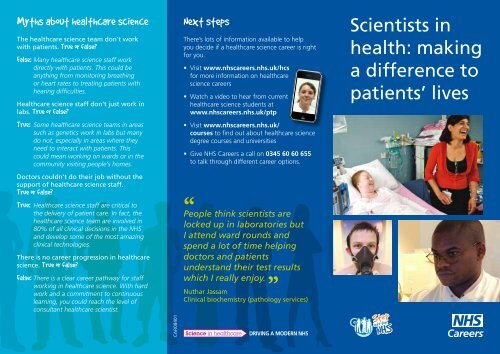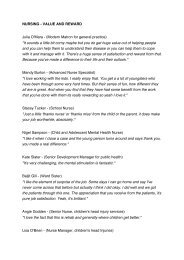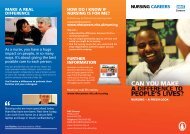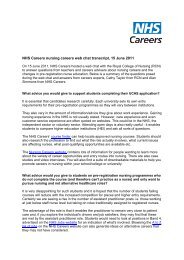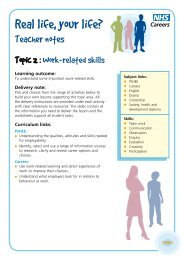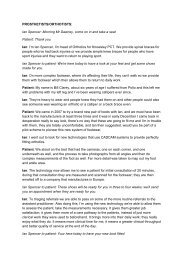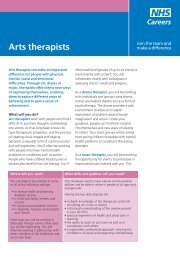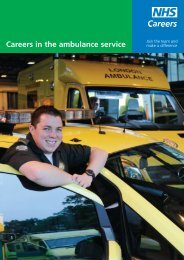leaflet - NHS Careers
leaflet - NHS Careers
leaflet - NHS Careers
Create successful ePaper yourself
Turn your PDF publications into a flip-book with our unique Google optimized e-Paper software.
Myths about healthcare science<br />
The healthcare science team don’t work<br />
with patients. True or false<br />
False: Many healthcare science staff work<br />
directly with patients. This could be<br />
anything from monitoring breathing<br />
or heart rates to treating patients with<br />
hearing difficulties.<br />
Healthcare science staff don’t just work in<br />
labs. True or false<br />
True: Some healthcare science teams in areas<br />
such as genetics work in labs but many<br />
do not, especially in areas where they<br />
need to interact with patients. This<br />
could mean working on wards or in the<br />
community visiting people’s homes.<br />
Doctors couldn’t do their job without the<br />
support of healthcare science staff.<br />
True or false<br />
True: Healthcare science staff are critical to<br />
the delivery of patient care. In fact, the<br />
healthcare science team are involved in<br />
80% of all clinical decisions in the <strong>NHS</strong><br />
and develop some of the most amazing<br />
clinical technologies.<br />
There is no career progression in healthcare<br />
science. True or false<br />
False: There is a clear career pathway for staff<br />
working in healthcare science. With hard<br />
work and a commitment to continuous<br />
learning, you could reach the level of<br />
consultant healthcare scientist.<br />
Next steps<br />
There’s lots of information available to help<br />
you decide if a healthcare science career is right<br />
for you.<br />
• Visit www.nhscareers.nhs.uk/hcs<br />
for more information on healthcare<br />
science careers<br />
• Watch a video to hear from current<br />
healthcare science students at<br />
www.nhscareers.nhs.uk/ptp<br />
• Visit www.nhscareers.nhs.uk/<br />
courses to find out about healthcare science<br />
degree courses and universities<br />
• Give <strong>NHS</strong> <strong>Careers</strong> a call on 0345 60 60 655<br />
to talk through different career options.<br />
“<br />
People think scientists are<br />
locked up in laboratories but<br />
I attend ward rounds and<br />
spend a lot of time helping<br />
doctors and patients<br />
understand their test results<br />
which I really enjoy.<br />
”<br />
Nuthar Jassam<br />
Clinical biochemistry (pathology services)<br />
Scientists in<br />
health: making<br />
a difference to<br />
patients’ lives<br />
CAR08401
Much more than just labs and<br />
test tubes<br />
All sorts of people work in healthcare science,<br />
doing all sorts of things to make a difference to<br />
patients’ lives every day.<br />
Just imagine. If you were working in healthcare<br />
science, you could be:<br />
• analysing blood or tissue to find out the<br />
cause of an illness<br />
• working directly with a patient to measure<br />
and monitor their breathing and help them<br />
overcome problems with sleeping<br />
• designing equipment like new hearing aids<br />
to make patients’ lives better<br />
• ensuring that equipment used in<br />
radiotherapy is delivering the correct dosage<br />
to patients<br />
• carrying out scans on patients with potential<br />
brain function or nerve disorders<br />
• making sure incubators for newborn babies<br />
work properly.<br />
There’s no end to how you could use your<br />
interest in science to help people.<br />
Getting in<br />
If you decide a healthcare science career is for<br />
you, think carefully about the training route<br />
you want to take and the area you would<br />
like to work in. Some work experience or<br />
volunteering may help you decide.<br />
You could join the team as an apprentice, study<br />
for a healthcare science degree or apply for<br />
the <strong>NHS</strong> Scientist Training Programme after<br />
you graduate with an appropriate BSc (Hons)<br />
science degree.<br />
Apprenticeships<br />
Healthcare science apprenticeships are already<br />
up and running in some parts of the country<br />
and are a fantastic route to becoming a<br />
healthcare science assistant. Pay for healthcare<br />
science assistants starts at £14k a year but<br />
there is the opportunity to earn more.<br />
Find out more at<br />
www.nhscareers.nhs.uk/hcsassistants<br />
Undergraduate degrees<br />
Degrees in healthcare science are available<br />
at some of the top universities in the<br />
country. You’ll spend 50 weeks of your<br />
degree gaining work-based training in the<br />
<strong>NHS</strong>. Once you’ve completed your degree,<br />
you’ll be eligible to apply for healthcare<br />
science practitioner roles. Your job<br />
prospects will be excellent and vacancies<br />
with a starting salary of at least £21k will<br />
be waiting for you across the country.<br />
Find out more at<br />
www.nhscareers.nhs.uk/ptp<br />
Postgraduate study<br />
If you decide to do a more traditional<br />
science degree at university, you can still<br />
join the healthcare science team after<br />
you graduate. The <strong>NHS</strong> Scientist Training<br />
Programme offers post-graduate study<br />
towards a masters degree while earning<br />
a salary in excess of £25k a year while<br />
you study.<br />
Find out more at<br />
www.nhscareers.nhs.uk/hcstp


